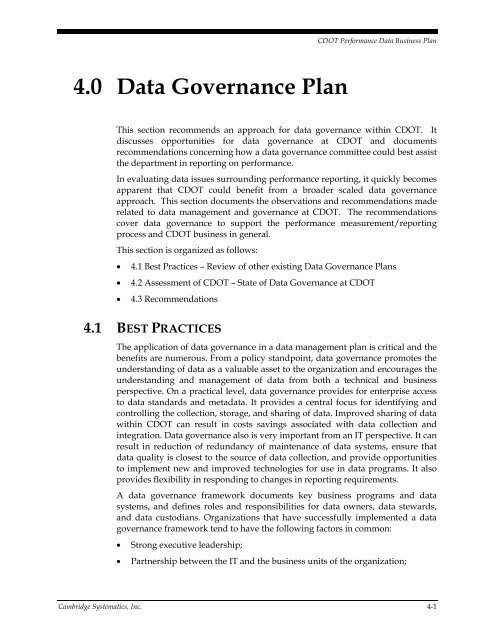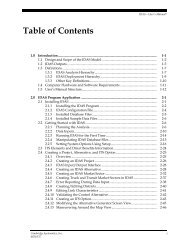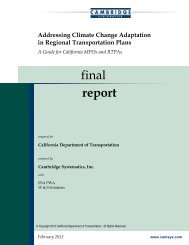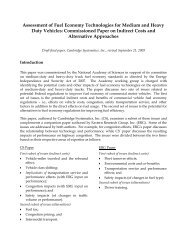CDOT Performance Data Business Plan - Cambridge Systematics
CDOT Performance Data Business Plan - Cambridge Systematics
CDOT Performance Data Business Plan - Cambridge Systematics
Create successful ePaper yourself
Turn your PDF publications into a flip-book with our unique Google optimized e-Paper software.
<strong>CDOT</strong> <strong>Performance</strong> <strong>Data</strong> <strong>Business</strong> <strong>Plan</strong><br />
4.0 <strong>Data</strong> Governance <strong>Plan</strong><br />
This section recommends an approach for data governance within <strong>CDOT</strong>. It<br />
discusses opportunities for data governance at <strong>CDOT</strong> and documents<br />
recommendations concerning how a data governance committee could best assist<br />
the department in reporting on performance.<br />
In evaluating data issues surrounding performance reporting, it quickly becomes<br />
apparent that <strong>CDOT</strong> could benefit from a broader scaled data governance<br />
approach. This section documents the observations and recommendations made<br />
related to data management and governance at <strong>CDOT</strong>. The recommendations<br />
cover data governance to support the performance measurement/reporting<br />
process and <strong>CDOT</strong> business in general.<br />
This section is organized as follows:<br />
<br />
<br />
<br />
4.1 Best Practices – Review of other existing <strong>Data</strong> Governance <strong>Plan</strong>s<br />
4.2 Assessment of <strong>CDOT</strong> – State of <strong>Data</strong> Governance at <strong>CDOT</strong><br />
4.3 Recommendations<br />
4.1 BEST PRACTICES<br />
The application of data governance in a data management plan is critical and the<br />
benefits are numerous. From a policy standpoint, data governance promotes the<br />
understanding of data as a valuable asset to the organization and encourages the<br />
understanding and management of data from both a technical and business<br />
perspective. On a practical level, data governance provides for enterprise access<br />
to data standards and metadata. It provides a central focus for identifying and<br />
controlling the collection, storage, and sharing of data. Improved sharing of data<br />
within <strong>CDOT</strong> can result in costs savings associated with data collection and<br />
integration. <strong>Data</strong> governance also is very important from an IT perspective. It can<br />
result in reduction of redundancy of maintenance of data systems, ensure that<br />
data quality is closest to the source of data collection, and provide opportunities<br />
to implement new and improved technologies for use in data programs. It also<br />
provides flexibility in responding to changes in reporting requirements.<br />
A data governance framework documents key business programs and data<br />
systems, and defines roles and responsibilities for data owners, data stewards,<br />
and data custodians. Organizations that have successfully implemented a data<br />
governance framework tend to have the following factors in common:<br />
<br />
<br />
Strong executive leadership;<br />
Partnership between the IT and the business units of the organization;<br />
<strong>Cambridge</strong> <strong>Systematics</strong>, Inc. 4-1

















